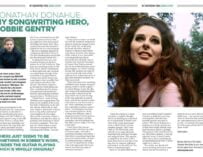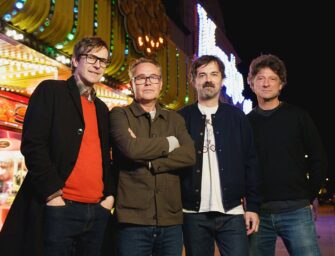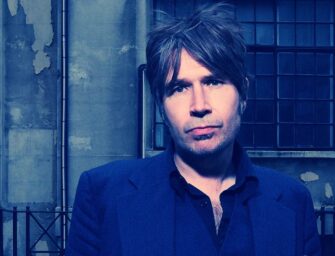
Jonathan Donahue (left) with long time bandmate Grasshopper: “The return of vinyl helps the return of Mercury Rev”
Ahead of the release of their first album in seven years, we caught up with the legendary Mercury Rev frontman
Jonathan Donahue is the elfin-voiced frontman of psych-pop veterans Mercury Rev. Along with long time bandmate Grasshopper, he has been the driving force behind the band’s sound, a kaleidoscopic orchestral tapestry built upon Donahue’s distinctive vocals. Perhaps still best known for their fifth album, 1998’s majestic Deserter’s Songs, the group now return after a seven-year hiatus with a new record The Light In You. No strangers to personnel changes, key formative member David Baker left the group in the early 90s, this album sees Donahue and Grasshopper take over soul production duties from David Fridmann for the first time.
Speaking with Jonathan ahead of the release of The Light In You, we were able to discuss its creation, his relationship with Grasshopper and the fact that Mercury Rev are a band who deserve to be heard on vinyl…
How does it feel to be back?
“It feels good, it really does. We’ve been very busy over the last seven years but it’s not been in the same spotlight as right now. We’re overwhelmed with interview requests and interest. You never know, after seven years people might forget and move on to young bands.”
Was a lot of that time spent working on the new album?
“Recording was only about 18 months but the brewing, boiling and bubbling of the cauldron was quite a bit longer. It’s hard to say, you put the seeds in the ground and sometimes you don’t even know that the seeds are in the ground, they’re just deep in the subconscious. The songs revealed themselves very quickly once I sat down and gathered all the scraps of paper from the nightstand. A lot of times I go to bed and then I wake up in the morning and there are all these scribbled notes. I don’t really remember writing them. They’re in hieroglyphics because I’m usually writing in the dark so I don’t disturb the girlfriend. I wake up in the morning and try to decipher all these runes.”
Have you always kept a pen and paper on the nightstand?
“It’s been a long time, probably since the early 90’s. It’s just something that seems to happen and it’s strange because I refer to it as ‘the eagles are coming’. Like something the birds bring you. It doesn’t happen every night but when it does it can happen many times in an evening and it usually comes in waves.”
[cc_blockquote_right] THE SONGS THEMSELVES DO A LOT OF THE SPEAKING, THEY’LL SUBCONSCIOUSLY TELL US WHAT THEY’RE WILLING TO ABSORB… [/cc_blockquote_right]
It sounds like they just arrive in your subconscious?
“It does, I think they just rise from the bottom of the ocean floor and surface on the waves and then sort of bob there. When I’m fortunate enough I’m able to pick them out like buoys.
“Usually the lyrical phrases will then find their way towards the musical phrases. That won’t happen in the middle of the night but that happens quite subconsciously too. You’re sitting down with a guitar, or at the piano, and the phrases come and I usually allow the two of them to meet on their own. Sometimes they take longer than others to go out on a first date, or even a second or third. They don’t always happen as quickly as I’d like, sometimes I’ve got a piano or organ phrase in my head for a while before the lyrical phrase will find its way there, but once they do they come together quite quickly.”
The genesis of your songs seems like a solitary process. At what point do you involve other people?
“I’ll probably bring them in to Grasshopper at a point where I feel almost certain that the lyrical phrases and musical melodies are meant to be. I ruminate on them and let them entangle and intertwingle at home on the cassette for quite a while. I don’t like backtracking too much in the studio. There’s always a lot of musical erasing and trial, but I’m usually quite certain where it’s going lyrically because I don’t like to waste the time of Grasshopper and the boys in the studio.”
Does Grasshopper then add to the music?
“I’ll have a musical outline of the song and the emotional content is usually in there already but why Grasshopper is great is that he gives it that extra Mercury Rev brushstroke. Or if I’ve painted myself into a corner musically, just a guitar line of his can really give the song that colour that I was hearing. I hear in colours more than in frequency, so I’ll say ‘I feel there’s more red in this song than I can dream up’ and he’s very good at fixing that.”
He understands the Mercury Rev language?
“Yeah, it’s very descriptive but we don’t say a lot in the studio, we do a lot of listening to the songs but we don’t do a lot of talking. Usually we can tell when something is going well because there’s nothing said, we just play. When something is running into a little bit of sand on the beach and slowing down we have to do some talking. We’ll then step back a bit and listen to what the song is asking for. The songs themselves do a lot of the speaking, they’ll subconsciously tell us what they’re willing to absorb and what they’re willing to radiate. Sometimes, like a horse, they’ll just buck off an idea that they’re not willing to carry”

Mercury Rev’s Jonathan Donahue (left): “I don’t mistake myself for the water, at my best I’m a really good faucet”
Is your working relationship with Grasshopper one that you fell back into comfortably?
“Over the years being together, writing and recording, we’re very patient and very conscious that it’s the songs that do the singing. We’re really very conscious of stepping out of the way and not bogging them down, not drowning them. Of course you have moments when you’re laying on a lot of paint to see what is there but in the finest moments, usually at the end of the day, the songs themselves are revealing the colours and the rest just falls away like leaves.”
Was the process of making The Light In You different to previous records?
“More than any other album, on this one the songs wrote themselves, or revealed themselves. Probably the one closest to this was Deserter’s Songs. Those songs came up out of me and I couldn’t hold them back. All I could do was watch.”
You’ve said about Deserter’s Songs that the darkness wasn’t an empty bucket, it was something full – was there a similar bucket to mine for this album?
“Yes, except that there was a little bit more understanding on my part of the fullness of that darkness than 18 years ago for Deserter’s Songs. Back then I wasn’t quite as comprehending of how full the darkness was, how pregnant it was with ideas. I was younger and I was going through a very difficult time emotionally. I was looking at the soil but I hadn’t stuck my finger in it, like a good farmer would, to be able to gauge all the different ingredients that go in to it.
“This time I had a lot more awareness and patience. I was also a lot more understanding of my own uncertainties in songwriting. I have a lot of self-doubt, I battle with it a lot. I’m not proud of it but it happens, it’s in me. Grasshopper has had to pull me off the ledge a few times and that had a lot to do with the album finally coming out. I was very uncertain of a lot of these songs, I didn’t know if they were good and I didn’t know if my singing was good. Sometimes you just wonder whether anyone actually wants to hear this anymore.”
[cc_blockquote_right] IT CAN GET A BIT LONELY AND WITHIN THAT LONELINESS YOU WONDER WHO IS STILL LISTENING? [/cc_blockquote_right]
We thought the album was great. Obviously you are your own harshest critic but I’m sure we won’t be the only ones to think that.
“I’m very grateful for people really coming out for this album, which they are, but again when you’re in the midst of writing you don’t know. I’m so sincere and I know what I do is quite unique to me and that’s comforting but at the same time it’s very isolating because there’s not a lot of reference points around me. It can get a bit lonely and within that loneliness you wonder who is still listening?”
When you’re looking back at an album like Deserter’s Songs, or a song like Holes, do you now think ‘actually I did a good job there’?
“I know I did a sincere job of revealing what wanted to come out of me, like the water faucet. I don’t mistake myself for the water, at my best I’m a really good faucet and I’ve opened myself up. Again, when you’ve opened yourself up to these songs like Holes, The Dark Is Rising or some of the new ones, you’re so vulnerable that you don’t have any confidence. There’s no ego because you’re just so opened up that you can’t explain what’s coming out of you. You know it’s true to you but in that there is a bewilderment of whether it will be true to anyone else.”
It sounds like a vicious circle, that the things which make your songs so rich leave you feeling isolated?
“Yeah, they do. I won’t say they take a lot out of you but they’re connected to a lot in you, so when they reveal themselves and shoot forth there are so many roots that are connected inside of you to them that any little shake or tremor sends giant ripples through your whole being. That’s probably why I am so close to songs like Holes even now, because I’m still so connected to that. Some of the songs on the new album as well, you just feel every neuron, every cell in your body is in some way still tethered to these songs, even when they go public.”
The Light In You starts in quite a dark place but ends up being quite uplifting. Was that a conscious decision?
“You’re absolutely correct but I didn’t see it at the time. It was only in the final sequencing of songs at the end when they puzzle-pieced themselves together. I was too close to it to see the arc of darkness into the radiant light, hence The Light In You. But when you’re in the midst of it, the eye is so close it can’t see all of itself. I wasn’t able to see the complete picture whereas Simon Raymonde had a good eye for the arc and was very good at illuminating it to myself and Grasshopper.”
Was that moment of illumination quite cathartic?
“It was, you just sort of stare in wonderment or listen with some sort of amazement that it was all there all along, but you couldn’t see it all.”

Jonathan (right): “The more I think ‘here’s the direction I’m going’ the more the cosmos comes in and shakes the snow globe”
Would you agree that Sunflower isn’t a typical Mercury Rev song?
“We didn’t expect it, when we came up with the bass riff and the general overtone we were laughing and smiling the whole time we recorded it. It came out quickly and it was just giant smiles between myself and Grasshopper and our long time bass player Anthony Molina, we were just smiling and saying ‘can you believe it?’ It was almost like we were inhabited by other beings because it doesn’t sound like us. I’m not a soul singer so when it was coming forth I was probably in more disbelief than most listeners will be. I don’t know where it came from, I’m very grateful for it but yeah it was completely by surprise.”
Can the song which closes the album, Rainy Day Record, be taken as an ode to the redemptive powers of music?
“The metaphor’s there but those are some of the literal albums I have and have had. Those bands still live in a sort of astral world on vinyl. When CDs and digital came in, a lot of groups didn’t make the transition from vinyl, but they’re still alive and they still sound fresh when you put those old albums on. They sound like they could have been made today. Maybe it was my own sort of redemptive way of saying, vinyl is bigger than just sounding like vinyl, it’s a living space for bands that never died.”
[cc_blockquote_right] THE RETURN OF VINYL HELPS THE RETURN OF MERCURY REV [/cc_blockquote_right]Mercury Rev aren’t really a band that should be heard through tinny computer speakers or cheap headphones.“In a way the album is a ritual, you have to sit down in one place, you can’t carry it with you. You have to sit there and move the needle. It’s a very meditative and contemplative ritual that’s been lost, most people listen to music on the tube or the subway or on their bicycle on the way to work and the idea of actually being still and quiet without any other distraction but the album has been lost. The return of vinyl helps the return of Mercury Rev because our music benefits so much by listening to a whole side of a whole album, not just cherry picking an MP3 on someone’s iTunes in-between lunch and going back to work. The demand for vinyl is incredible because I think for a lot of people that’s the way they visualise, or audiolise, Mercury Rev. It is that ritual, it is that moment of stillness at the end of the day.”
Rainy Day Record references Elliott Smith, Sonic Youth and The Fall, are they things you were listening to at the time of making The Light In You?
“Probably all of those at moments, not necessarily as inspiration or influence but just because they’re never off my turntable. I don’t listen to a lot of new bands, but I do listen to a lot of older bands in new ways.”
Anyone in particular?
“Probably the older electronic pioneers like Terry Riley, or Ravi Shankar and some of the Indian sārangī music. I put on some of that old vinyl from the 60s and 70s and suddenly I get it even more, or maybe I get it even better than I did when I first heard the records. I hear the beauty of the composition and hear the emotion even deeper. It’s like reading a favourite book 20 or 30 years later, all of a sudden this new life comes out of the lines and even more importantly it comes out of the space between the words. It’s the difference between staring at the stars and going ‘oh look at them twinkle’ or really looking at them in a way that says ‘look at the space between the stars, what are the distances?’ Imagining those distances really puts the depth into something. It gives that 4th or 5th dimension to music that a lot of newer bands are probably working really hard to try to figure out. Back in the day you had to listen in terms of the whole album, you had to read the whole book, you had to go from chapter one to chapter ten and younger bands are unfortunately swallowed by that because people have been cherry picking songs from albums and jumbled them up in this iPod shuffle thing and they lose the whole trajectory.”
With all that experience, do you think you’re now a better songwriter than you were 25 years ago?
“I don’t know about that. I know that I’m better at whatever is in me being revealed more accurately. More sincerely, without filter. I’d like to think that maybe more than just a better songwriter I’m a better man than I was 20 or 30 years ago. I’m more accepting, not only of myself but also of the songwriter that I am. When you’re 20 you are trying to be a thousand people, now I’m just giving the best I can to be Jonathan.
“I think that is the artist coming into his own. There’s an acceptance of the trajectory and the evolution of the songwriting that’s coming out of you, that’s liberation, that’s the liberated artist. It’s the artist that isn’t looking for results, it’s the artist that isn’t looking to fit in commercially or looking to appease anyone but his own inner guide.”
Finally, is there anything niggling away that you want to do next?
“Sometimes there is and I’ll say ‘this is the next step for me’ and you know it never fails that it doesn’t happen that way. The more I think ‘here’s the direction I’m going’ the more the cosmos comes in and shakes the snow globe. And to be honest, and this is really important, the only real way I can actually see what I’ve done is when it’s reflected back to me from listeners and from journalists like yourself. Without the mirror I can’t see anything and so when the album is released, and over the next year or two, I’ll actually have some composite of what it is that’s come out of me. Right now it’s still in the darkness. Until the listeners start to bounce it back to me and I can see it in their wide eyes, or just hear it in their voices, I really don’t know what the sculpture is and I can’t see all the colours in the painting.”
Interview: Duncan Haskell
The Light In You is out now on Bella Union and Mercury Rev will be playing some UK dates in October and November, for more information go to the band’s website: mercuryrev.com



































Related Articles